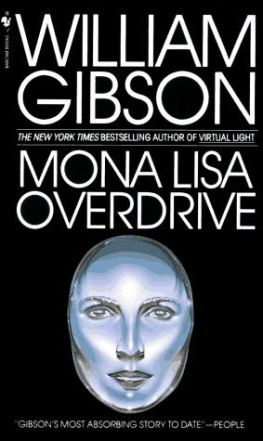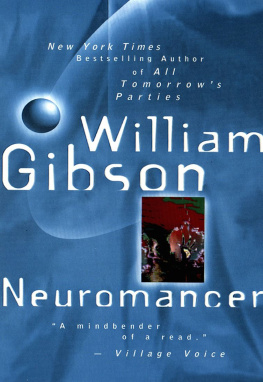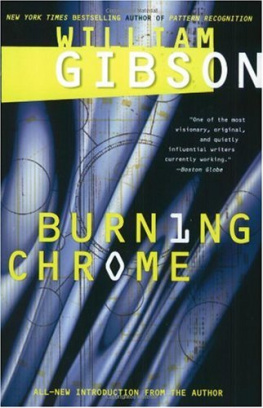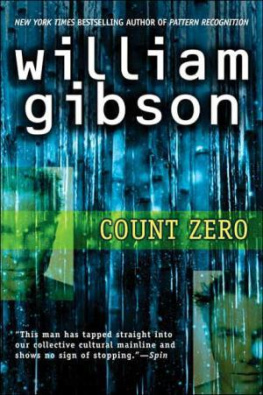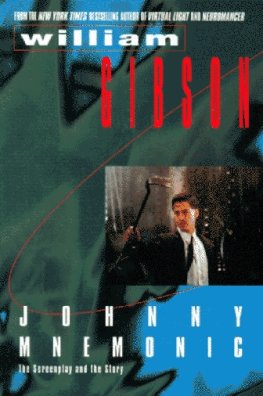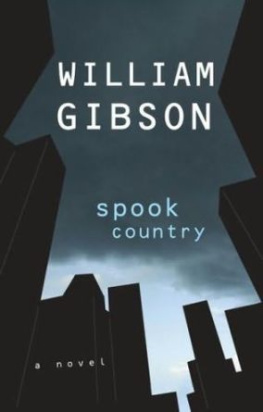William Gibson - All Tomorrows Parties
Here you can read online William Gibson - All Tomorrows Parties full text of the book (entire story) in english for free. Download pdf and epub, get meaning, cover and reviews about this ebook. year: 2000, publisher: Penguin Books, genre: Detective and thriller. Description of the work, (preface) as well as reviews are available. Best literature library LitArk.com created for fans of good reading and offers a wide selection of genres:
Romance novel
Science fiction
Adventure
Detective
Science
History
Home and family
Prose
Art
Politics
Computer
Non-fiction
Religion
Business
Children
Humor
Choose a favorite category and find really read worthwhile books. Enjoy immersion in the world of imagination, feel the emotions of the characters or learn something new for yourself, make an fascinating discovery.

- Book:All Tomorrows Parties
- Author:
- Publisher:Penguin Books
- Genre:
- Year:2000
- Rating:3 / 5
- Favourites:Add to favourites
- Your mark:
- 60
- 1
- 2
- 3
- 4
- 5
All Tomorrows Parties: summary, description and annotation
We offer to read an annotation, description, summary or preface (depends on what the author of the book "All Tomorrows Parties" wrote himself). If you haven't found the necessary information about the book — write in the comments, we will try to find it.
All Tomorrows Parties — read online for free the complete book (whole text) full work
Below is the text of the book, divided by pages. System saving the place of the last page read, allows you to conveniently read the book "All Tomorrows Parties" online for free, without having to search again every time where you left off. Put a bookmark, and you can go to the page where you finished reading at any time.
Font size:
Interval:
Bookmark:
PENGUIN BOOKS
ALL TOMORROW'S PARTIES
William Gibson is the award-winning author of Neuromancer, Mona Lisa Overdrive, The Difference Engine (with Bruce Sterling), Virtual Light and Idoru. He lives in Vancouver, Canada.
WILLIAM GIBSON

PENGUIN BOOKS
PENGUIN BOOKS
Published by the Penguin Group
Penguin Books Ltd, 80 Strand, London WC2R 0RL, England
Penguin Putnam Inc., 375 Hudson Street, New York, New York 10014, USA
Penguin Books Australia Ltd, 250 Camberwell Road, Camberwell, Victoria 3124, Australia
Penguin Books Canada Ltd, 10 Alcorn Avenue, Toronto, Ontario, Canada M4V 3B2
Penguin Books India (P) Ltd, 11 Community Centre, Panchsheel Park, New Delhi 110 017, India
Penguin Books (NZ) Ltd, Cnr Rosedale and Airborne Roads, Albany, Auckland, New Zealand
Penguin Books (South Africa) (Pty) Ltd, 24 Sturdee Avenue, Rosebank 2196, South Africa
Penguin Books Ltd, Registered Offices: 80 Strand, London WC2R 0RL, England
www.penguin.com
First published in the United States by G.P. Putnam's Sons 1999
First published in Great Britain by Viking 1999
Published in Penguin Books 2000
Copyright William Gibson, 1999
All rights reserved
The moral right of the author has been asserted
Except in the United States of America, this book is sold subject to the condition that it shall not, by way of trade or otherwise, be lent, re-sold, hired out, or otherwise circulated without the publisher's prior consent in any form of binding or cover other than that in which it is published and without a similar condition including this condition being imposed on the subsequent purchaser
ISBN: 978-0-14-191003-1
TO GRAEME AND THE BADCHAIRS
THROUGH this evening's tide of faces unregistered, unrecognized, amid hurrying black shoes, furled umbrellas, the crowd descending like a single organism into the station's airless heart, comes Shinya Yamazaki, his notebook clasped beneath his arm like the egg case of some modest but moderately successful marine species.
Evolved to cope with jostling elbows, oversized Ginza shopping bags, ruthless briefcases, Yamazaki and his small burden of information go down into the neon depths. Toward this tributary of relative quiet, a tiled corridor connecting parallel escalators.
Central columns, sheathed in green ceramic, support a ceiling pocked with dust-furred ventilators, smoke detectors, speakers. Behind the columns, against the far wall, derelict shipping cartons huddle in a ragged train, improvised shelters constructed by the city's homeless. Yamazaki halts, and in that moment all the oceanic clatter of commuting feet washes in, no longer held back by his sense of mission, and he deeply and sincerely wishes he were elsewhere.
He winces, violently, as a fashionable young matron, features swathed in Chanel micropore, rolls over his toes with an expensive three-wheeled stroller. Blurting a convulsive apology, Yamazaki glimpses the infant passenger through flexible curtains of some pink-tinted plastic, the glow of a video display winking as its mother trundles determinedly away.
Yamazaki sighs, unheard, and limps toward the cardboard shelters. He wonders briefly what the passing commuters will think, to see him enter the carton fifth from the left. It is scarcely the height of his chest, longer than the others, vaguely coffin-like, a flap of thumb-smudged white corrugate serving as its door.
Perhaps they will not see him, he thinks. Just as he himself has never seen anyone enter or exit one of these tidy hovels. It is as though their inhabitants are rendered invisible in the transaction that allows such structures to exist in the context of the station. He is a student of existential sociology, and such transactions have been his particular concern.
And now he hesitates, fighting the urge to remove his shoes and place them beside the rather greasy-looking pair of yellow plastic sandals arranged beside the entrance flap on a carefully folded sheet of Parco gift wrap. No, he thinks, imagining himself waylaid within, struggling with faceless enemies in a labyrinth of cardboard. Best he not be shoeless.
Sighing again, he drops to his knees, the notebook clutched in both hands. He kneels for an instant, hearing the hurrying feet of those who pass behind him. Then he places the notebook on the ceramic tile of the station's floor and shoves it forward, beneath the corrugate flap, and follows it on his hands and knees.
He desperately hopes that he has found the right carton.
He freezes there in unexpected light and heat. A single halogen fixture floods the tiny room with the frequency of desert sunlight. Unventilated, it heats the space like a reptile's cage.
Come in, says the old man, in Japanese. Don't leave your ass hanging out that way. He is naked except for a sort of breechclout twisted from what may once have been a red T-shirt. He is seated, cross-legged, on a ragged, paint-flecked tatami mat. He holds a brightly colored toy figure in one hand, a slender brush in the other. Yamazaki sees that the thing is a model of some kind, a robot or military exoskeleton. It glitters in the sun-bright light, blue and red and silver. Small tools are spread on the tatami: a razor knife, a sprue cutter, curls of emery paper.
The old man is very thin, clean-shaven but in need of a haircut. Wisps of gray hair hang on either side of his face, and his mouth is set in what looks to be a permanent scowl of disapproval. He wears glasses with heavy black plastic frames and archaically thick lenses. The lenses catch the light.
Yamazaki creeps obediently into the carton, feeling the door flap drop shut behind him. On hands and knees, he resists the urge to try to bow.
He's waiting, the old man says, his brush tip poised above the figure in his hand. In there. Moving only his head.
Yamazaki sees that the carton has been reinforced with mailing tubes, a system that echoes the traditional post-and-beam architecture of Japan, the tubes lashed together with lengths of salvaged poly-ribbon. There are too many objects here, in this tiny space. Towels and blankets and cooking pots on cardboard shelves. Books. A small television.
In there? Yamazaki indicates what he takes to be another door, like the entrance to a hutch, curtained with a soiled square of melon-yellow, foam-cored blanket, the sort of blanket one finds in a capsule hotel. But the brush tip dips to touch the model, and the old man is lost in the concentration this requires, so Yamazaki shuffles on hands and knees across the absurdly tiny space and draws the section of blanket aside. Darkness.
Laney-San?
What seems to be a crumpled sleeping bag. He smells sickness
Yeah? A croak. In here.
Drawing a deep breath, Yamazaki crawls in, pushing his notebook before him. When the melon-yellow blanket falls across the entrance, brightness glows through the synthetic fabric and the thin foam core, like tropical sunlight seen from deep within some coral grotto.
Laney?
The American groans. Seems to turn, or sit up. Yamazaki can't see. Something covers Laney's eyes. Red wink of a diode. Cables. Faint gleam of the interface, reflected in a thin line against Laney's sweat-slick cheekbone.
I'm deep in, now, Laney says, and coughs.
Deep in what?
They didn't follow you, did they?
I don't think so.
I could tell if they had.
Yamazaki feels sweat run suddenly from both his armpits, coursing down across his ribs. He forces himself to breathe. The air here is foul, thick. He thinks of the seventeen known strains of multi-drug-resistant tuberculosis.
Next pageFont size:
Interval:
Bookmark:
Similar books «All Tomorrows Parties»
Look at similar books to All Tomorrows Parties. We have selected literature similar in name and meaning in the hope of providing readers with more options to find new, interesting, not yet read works.
Discussion, reviews of the book All Tomorrows Parties and just readers' own opinions. Leave your comments, write what you think about the work, its meaning or the main characters. Specify what exactly you liked and what you didn't like, and why you think so.

